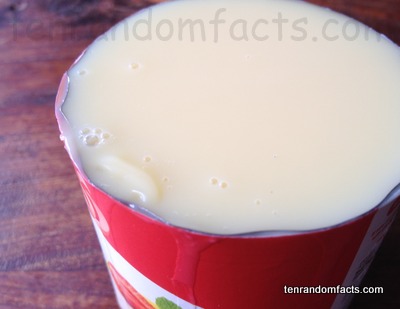Condensed milk is as compact as they get.
- Condensed milk is a liquid used as a cooking item, produced from milk that has had the majority of the water content evaporated through a vacuum and heating process.
- The phrase ‘condensed milk’ typically refers to ‘sweetened condensed milk’, while the term ‘evaporated milk’ usually refers to the unsweetened variety.
- Sweetened condensed milk consistency is thick and oozing, rather than the typical flowing behaviour of milk, and it has a very sweet, creamy taste, while the unsweetened version is more like milk in flavour and viscosity.
- The Tartar people of Europe and Asia, are said to be the first people known to remove water from milk to increase volume per container, and would add water to use it at a later stage – a practice observed by Marco Polo, on his travels in the 1200s.
- Condensed milk is typically sweetened through the addition of sugar, after the milk has been evaporated; and the product is commonly sold in either tin cans or tubes, and is readily available in supermarkets.
- American Gail Borden Jr. was the first to invent condensed milk that was commercially viable, in the 1850s, though attempts had been made as early as 1809, by Nicolas Appert of France.
- To make sweeten condensed milk, roughly eleven parts of sugar are added to nine parts of evaporated milk, meaning that the product consists of 45% sugar, or sometimes more.
- Sweetened condensed milk is most often used in desserts, such as chocolate dishes, pies, cakes and sweets, as well as coffee.
- As a ration included in American soldier packs by the mid-1800s, condensed milk began to rise in public popularity, as war veterans returned home with knowledge of this new food.
- Sweetened condensed milk has high quantities of protein, riboflavin, calcium, phosphorous, selenium and fat, and it has many other vitamins and minerals.
Bibliography:
Condensed Milk, 2015, Wikipedia, https://en.wikipedia.org/wiki/Condensed_milk
Encyclopedia of Dairy Sciences 2nd Edition, Four-Volume set, 2011, Academic Press, Google Books, https://books.google.com.au/[…]
Gail Borden, 2016, Today in Science History, http://todayinsci.com/Events/Patent/CondensedMilk15553.htm







